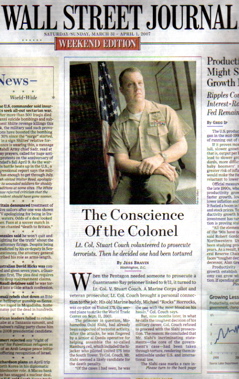Here’s one of those Wall Street Journal frontpagers that ought to be required reading for its editorial board: “The Conscience of the Colonel,” by Jess Bravin. It’s about a military prosecutor with a deeply personal reason to seek the conviction of a Gitmo prisoner connected to 9/11 and an even deeper reason not to prosecute him.
 The prosecutor’s “old Marine buddy, Michael ‘Rocks’ Horrocks, was co-pilot on United 175, the second plane to strike the World Trade Center on Sept. 11, 2001,” Bravin writes. “The prisoner in question, Mohamedou Ould Slahi, had already been suspected of terrorist activity. After the attacks, he was fingered by a senior al Qaeda operative for helping assemble the so-called Hamburg cell, which included the hijacker who piloted United 175 into the South Tower. To Col. Couch, Mr. Slahi seemed a likely candidate for the death penalty.”
The prosecutor’s “old Marine buddy, Michael ‘Rocks’ Horrocks, was co-pilot on United 175, the second plane to strike the World Trade Center on Sept. 11, 2001,” Bravin writes. “The prisoner in question, Mohamedou Ould Slahi, had already been suspected of terrorist activity. After the attacks, he was fingered by a senior al Qaeda operative for helping assemble the so-called Hamburg cell, which included the hijacker who piloted United 175 into the South Tower. To Col. Couch, Mr. Slahi seemed a likely candidate for the death penalty.”
“Of the cases I had seen, he was the one with the most blood on his hands,” Col. Couch says.
But, nine months later, in what he calls the toughest decision of his military career, Col. Couch refused to proceed with the Slahi prosecution. The reason: He concluded that Mr. Slahi’s incriminating statements — the core of the government’s case — had been taken through torture, rendering them inadmissible under U.S. and international law.
The Slahi case marks a rare instance of a military prosecutor refusing to bring charges because he thought evidence was tainted by torture.
It’s too bad Bravin’s reporting legitimizes a newspaper whose editorial writers and columnists refuse to believe the work of the paper’s own news staffers like him.
Go read his article on online. I wouldn’t bet on it, but the link is supposed to be available to non-subscribers for the next seven days, along with links to “key documents.” This one, for instance. (If you click and can’t get more than a summary of the story and/or the linked document, it’s because The Journal has locked you out, despite advertising the freebie.)
Postscript: William Osborne writes, “Good point. (‘It’s too bad Bravin’s reporting legitimizes a newspaper whose editorial writers and columnists refuse to believe the work of the paper’s own news staffers like him.’)” He continues:
What is so amazingly clever about these big papers is that the propaganda is never based on a single article. Instead, a Gestalt of articles is created serving different purposes that all work together: articles with false information and analysis; articles to establish false alibis; articles to create the false impression of balance and impartiality; articles to distract people from the truth hidden in plain sight; and articles banalizing immoral or unethical actions in order to inure the readers to their wrongness. Often the writing is very subtly specious.
It is only through all of these methods placed along side each other and in sequence, then repeated over and over, that true propaganda is created. And the motive? It takes little more than being allowed into the circle of big-foot reporters with full knowledge that status will be lost if they cross certain lines. There are a lot of views and approaches, but all guided into an isomorphic stance shaped by big money. People will naturally circle around the Golden Calf, and it will eventually shape their view of reality.
There is more to it — and there are exceptions like Bravin’s (whose work, in any case, is put to use for the Gestalt) — but at least that much I can see.
Speaking of the pressure to conform: The author of the V.I. Warshawski novels, Sara Paretsky, who has a collection of essays, “Writing in an Age of Silence,” due out this month, recalls her chilling experience in today’s Chicago Tribune.
The night we began our invasion of Iraq — March 20, 2003 — I was speaking at the Toledo public library. The day before, my speakers bureau told me that the library wanted me to change my proposed remarks; my talk on how the Patriot Act was affecting writers, readers and libraries was too political. The library wanted instead the kind of humorous anecdotes that other writers used. With war imminent, the library felt that a criticism of the Bush administration was an insult to local families who had relatives in the service.
Haven’t we had enough of our BananaRepublic-cum-President With His Head Up His Ass?




